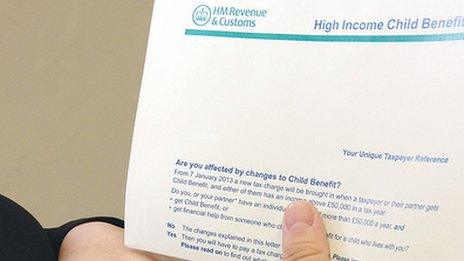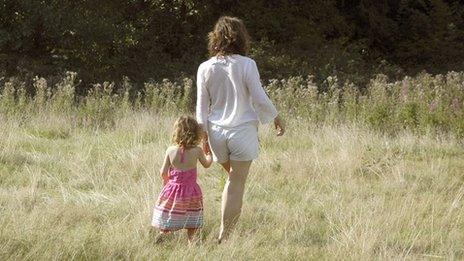Child benefit: Public not unaware, says Revenue and Customs
- Published

Child benefit amounts to £20.30 a week for an eldest or only child
The public are aware of imminent changes which could see more than a million people lose all or some of their child benefit, officials insist.
From next week, families with one parent earning more than £50,000 will no longer be eligible for the full sum in a shake-up first announced in 2010.
Officials have written to 784,000 of the estimated 1.1 million affected and say the message is "getting through".
But Labour says many people unaware of the move face a "nasty surprise".
Changes to child benefit payments for the better-off - introducing means-testing for the previously universal benefit - come into effect at midnight on 7 January.
Families where one parent earns between £50,000 and £60,000 will see their benefit - worth £20.30 a week for the first child and £13.40 for each child after that - progressively reduced based on income.
Eligible households where one individual earns more than £60,000 will lose them altogether, with the money to be recovered through the tax system.
'Changed circumstances'
The plan has proved controversial since it was first announced by Chancellor George Osborne more than two years ago as one of a number of austerity measures designed to reduce the deficit.
Those affected will need to fill out self-assessment tax forms for the current financial year - starting in April - to show they still qualify for the payments.
Unless people choose to opt out from receiving the benefit, they will continue to receive the money but will have to pay a charge at the end of the year.
Under the plan, the benefit will still be paid to mothers but will be reclaimed through tax payments made by the highest earner in the household whose salary exceeds £50,000.
The Daily Telegraph, external estimated that 316,000 of the 1.1 million families affected had yet to be formally informed about the changes and the implications.
Revenue and Customs acknowledged that some people were proving harder to track down as the authorities held incomplete information about them.
"There may be cases where people's circumstances have changed," a spokesman said.
"For example, their income may have increased or address may have changed and we will not yet have up-to-date information."
There had been an "extensive" advertising campaign to let people know about the shake-up, he said, as well as comprehensive coverage in the media.
The fact, he added, that there had been more than a million hits on the guidance section, external of the Revenue and Customs website and 100,000 people had used its online calculator to see if they would be affected showed that "the message is getting through".
'Unfair'
Leading accountants have warned that the system of recovering the money has become too complex and Labour claims the changes have not been properly thought through.
"The could be a nasty surprise in store for thousands of parents if they are not aware of the changes and have to pay back thousands of pounds in child benefits at the end of the year," said shadow Treasury minister Catherine McKinnell.
Critics have warned the changes are "unfair" and anomalies have not be addressed.
As it stands, a family where two parents work and both earn £49,000 a year will keep their benefits. On the other hand, a family with a single earner on £51,000 - where the other parent has chosen to stay at home in a caring role - will lose part of theirs.
So far, 169,550 people have chosen to opt out from receiving the benefits entirely.
The Treasury defended the changes, saying it was "very difficult to justify" paying child benefit to the wealthiest 15% of families in the current economic climate.
"We must deal with Labour's deficit so that our children do not have to and to do so in a way that is fair," a spokesman said.
- Published30 October 2012

- Published29 October 2012

- Published22 September 2014
